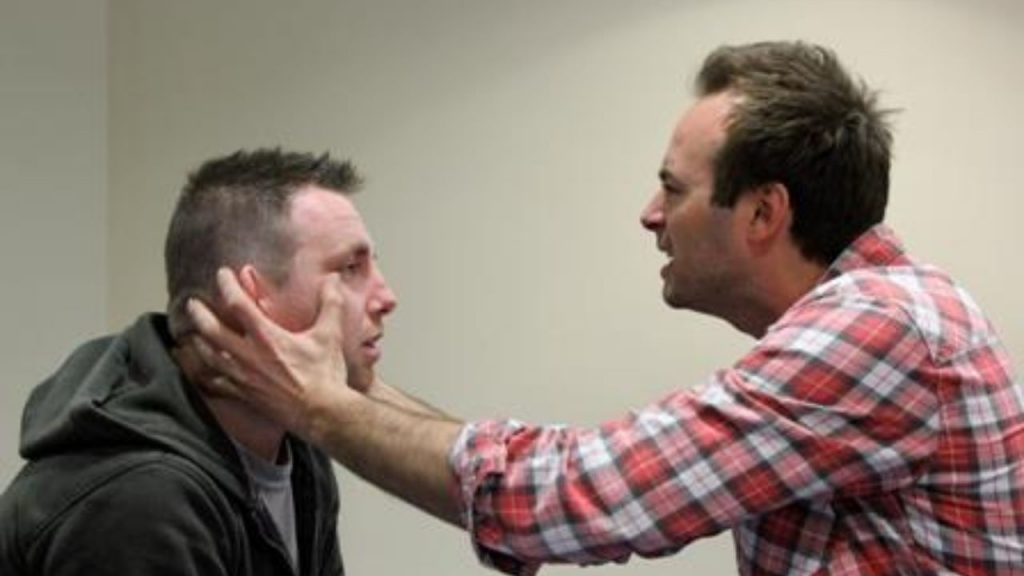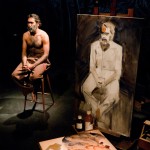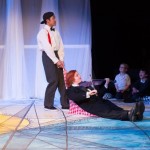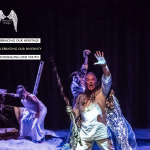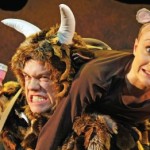Ruben Guthrie
Genre: Drama
Venue: New Wimbledon Studio The Broadway, London SW19 1QG
Low Down
IronBark Theatre, a company specialising in presenting Australian theatre in the UK, produced an excellent production of Ruben Guthrie, an award-winning play by an acclaimed young Australian playwright, Brendon Cowell at the New Wimbledon Studio. The play premiered in 2008 in Sydney at the Belvoir Theatre Downstairs: a production by Belvoir’s Company B which went on to win Play of the Year (Time Out Sydney) and to be shortlisted for the Sydney Theatre Award for Best New Australian Work. Cowell was also shortlisted that year for the New South Wales Premier’s Literary Award. Judging from what I experienced at the New Wimbledon, the play continues to engage audiences in Australia, New Zealand and now London. Its London production delivered a wide range of emotions: from brutally honest views on alcoholism and drug addiction through to desperately tender moments showing human desire in the complex hedonistic world of mass advertising and personal consumption.
Review
As a creator and writer of advertisements, Ruben Guthrie knows how to deliver what people want. The image of a refrigerator full of ice-cold Coke planted on an Iraqi street, in sight of thirsty soldiers on patrol in the Middle Eastern heat, is just one ironic image in the opening monologue. Such an unlikely occurrence is set to disconcert the audience as it steadily comes to know the lone figure on stage, Ruben Guthrie, seated with his arm in a sling and his forehead bearing stitches. The immediate realisation that the well-defined white square stage is the encircled empty space of an AA meeting, propels it into playing what Augusto Boal termed the role of ‘spect-actor’: an audience both detached from yet also participating in the drama. However, unlike Boal’s didactic Forum Theatre, Cowell uses the audience’s ironic views to draw on a depth of compassion and understanding. Its judgement of Ruben Guthrie’s actions are held tantalisingly just within reach yet also paradoxically impossible to hold onto as the permutations of the play’s motivations and their implications evolve.
Nicola Samer’s artistic direction and Alyson Cummin’s design are intelligent and subtle as they apply both a naturalistic style and a more symbolic and iconic set design. This pairing is foundational to the relationship between the presentation of Ruben’s character and the stage/life that he occupies. Situations and conflicts through various encounters with his boss, parents, girlfriends and best friend literally leave their mark on the floor. For me, it was like watching skin being bruised and torn as the inherent violence of self-destructive remained forever present in the play’s staging.
Nick Hardcastle’s portrayal of Ruben is very engaging. What’s not to love about a good-looking, fun-loving and highly imaginative young man? Ruben is the complete package: boarding school education, high-paid job, a beautiful fiancée and a string of event showing him having great times. But Hardcastle’s realisation of the role relies on Ruben’s defiance of reality as he ignores his psychological and physical limitations and fuels his experiences with alcohol and drugs. As he sits soberly in the AA meeting we learn that this literally causes him to crash land as his injuries are the result of him flying off a hotel balcony into a swimming pool below. As a latter-day Icarus, this is made more poignant as he goes onto reveal how his mother and girlfriend have forced him to come to the meeting because he was nearly killed by in fact ending up in a children’s wading pool.
Nicola Samer direction of the ensemble, which moves on and off the stage from that point on, is masterful. She sets up the world around the stage like a spinning satellite around the action which mostly takes place in Ruben’s flat: his bathroom off stage left; the street in which he has the altercation with his girlfriend off centre stage; and his parents’ successful restaurant somewhere way-out-there are all part of Ruben’s epic quest towards sobriety. The performances give a sense of being arranged as a series of stand-up, duo and trio acts. Only once in the whole play are all the cast members on stage at the same time. This occurs at a profound moment in the second half of the play when all the complex contradictions of Ruben’s life lead to his relapse as ‘they’ – the people in his life – destroy his willpower and so drive him to drink. Such an objectification of the problem skilfully doubles as part of the problem itself.
The ensemble of seven characters, which IronBark brought together for the production, creates memorable performances. Rose O’Loughlin’s as Ruben’s young girlfriend Zoya, a photographic model from the Czech Republic, reveals a struggle for identity which is robustly portrayed alongside her own complicity in choosing to work in the fame-producing industry. Ruben’s other love interest is Virginia, an ex-junkie whose participation in AA resembles an evangelical born-again energy. Virginia sets out to reform Ruben as she works to negotiate the minefield of her own traumatic life, which is hinted to contain sexual as well as physical abuse. Most noticeably, both Zoya and Virginia are not just Ruben’s girlfriends but hold the status of fiancée: the term distinguishes these two women from the one-night stands which drink obliterates from memory. Such a distinction ties into the ‘madonna’ and ‘whore’ split in which Ruben’s treats women in general: he is respectful, kind and supportive one moment and abusive and predatory in the next. Jemma Walker gives a great portrayal of the paranoid and righteous Virginia. She seems to be able to contrast herself in relation to the other women in the play: with Zoya, the maturing child-bride, and Mum, the menopausal woman who damns herself for losing her husband’s sexual interest.
Timothy Knightley’s portrayal of Ruben’s boss, Ray, is clear and strong: his one-dimensional nature well-motivated by the character’s defended position that shows that while he has survived his own harrowing fight with alcoholism, he has no intention to assist Ruben. Quite the contrary, his success as an advertising manager is to engender the ‘creative genius’ in Ruben to make advertisements, for instance, for selling young girls sweet, lollipop coloured alcoholic drinks. Ray portrays all the galling hypocrisy of a pusher who abstains from wasting his own life on the drugs he is nonetheless prepared to pedal.
Edmund Dehn’s portrayal of Peter, Ruben’s father, and Virge Gilchrist’s role as the nameless ‘Mum’ are the most caricature- like roles in the play: Peter as a put-another-scrimp-on-the-barbie type Aussie male and Mum as a type of conservative woman thought to be found in Australia’s Country Women’s Association or Karrakatta Club. Aspirational members of the baby-boomer generation, Ruben’s parents have done well for themselves: they have sent their son to boarding school and have run a successful business yet – also true to type – around their thirtieth year of marriage the wheels come off their relationship. Dad ‘runs off’ and has an affair with a much younger woman (ironically presented in the play as a docile Asian woman who serves him). With this, Mum is left alone in the family home to analyse ‘what went wrong’: both in her relationship with her own alcoholic father and her marriage to another alcoholic. The audience is reminded of this as Virge Gilchrist shows a particularly wonderful sense of comic timing and bathos as Mum comes on stage at various times with the latest ‘brochure’ from which she reads the latest advice.
The last character we encounter in the play is Ruben’s best friend Damian whose homosexuality is portrayed as a kind of bacchanalian revelry of endless sex romps and drug-induced freedom. I found Tom Feary-Campbell treatment of the role the least satisfying: while he portrayed Damian’s love for Ruben clearly enough, somehow the portrayal was to gave little sense of the inner struggle that I saw in other roles.
Taken together, each role added to the story by showing how alcoholism exists intergenerationally: deeply entrenched in both our families and cultures. I was profoundly moved by the young audience members around me as they engaged with the unfolding events: in one case, even speaking back to the actions with comments like ‘can you believe it?’, ‘oh no, come on…’ – all comments which further revealed for me the way the production was able to elicit from the audience the dual perspective of spect-actor. People remained in the auditorium for at least fifteen minutes after the show, discussing the play and talking to the actors, director and producers. Some of the conviviality I’m sure was due to the many Australians present who perhaps lingered together more than they would because of the play’s many Australian references. But in truth, for me it made little difference that the play was ‘Australian’: I believe it just as well could have been staged by replacing the geographic references to Sydney’s Surrey Hills and Centennial Park with their local London equivalents of Southwark (like Surrey Hills containing good theatres and close to the city centre) and Hyde Park.
In fact, I began to get annoyed with what seemed to me to be overly exaggerated Australian accents. Instead, I viewed Brendan Cowell’s play as the work of a more cosmopolitan Australian artist who was prepared to move into the complex urban sprawl of cultural and personal encounters that consume us regardless of our specific geography. As Cowell demonstrates, such an interrogation of our humanity need not lead to thoughtless generalisations and insipid artistic work. Quite the contrary, IronBark Theatre’s production Ruben Guthrie shows the best of many worlds: as particular and detailed as the individual the audience comes to know in the play as Ruben Guthrie and as cross-cultural and epic as all humans prepared to confront what it means to be fully present in and responsible for living with the important people in our lives.
Reviewed by Josey De Rossi 16 March 2012
Website :
http://www.ironbarkpresents.com/IronBark/Home.html
http://www.facebook.com/pages/Ruben-Guthrie/105824166213651
